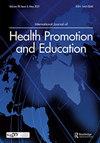Celebrating 60 years of the International Journal of Health Promotion and Education
IF 0.7
Q3 EDUCATION, SCIENTIFIC DISCIPLINES
International Journal of Health Promotion and Education
Pub Date : 2022-11-02
DOI:10.1080/14635240.2022.2146865
引用次数: 1
Abstract
The year 2022 is a momentous anniversary for the International Journal of Health Promotion and Education (IJHPE). It was sixty years ago that the management committee of the Institute of Health Education, the former name of the Institute of Health Promotion and Education (IHPE), agreed to fund an authoritative publication to publicise the theoretical and research basis of the new subject of Health Education. In 1960 only a few people working in healthcare believed that many of our common health issues were related to individual patterns of behaviour. Drug therapy was not the answer to maintaining health. Life-style was just as important. However, educating people about how to improve their health was not popular with either the political or medical establishments. It was often considered a waste of resources. For example, in the 1970s the British Medical Association still had ashtrays in the majority of their meeting rooms so members could smoke. Of course, this was no different from most organisations. Controlling smoking and alcohol consumption were definitely not welcomed by many commercial companies who could rely on political support from many politicians to dilute and discredit any health advice which might reduce profits. In addition, the science supporting the effectiveness of many health education initiatives was poorly developed. Indeed, the evaluation of health education was basic and grandiose claims for effectiveness were ill conceived and of little scientific merit. Nevertheless, as the 20 century moved on more evidence was published on the need for governments to develop and expand health promotion in order to deal with intractable health issues. The IJHPE was at the forefront of publishing scientific papers that supported the need for well-designed research. Academics highlighted the importance of targeted educational programmes to improve health and reduce the prevalence of high risk personal behaviours. Frank St D Rowntree the founding editor of the Journal and his main academic advisor Professor Leo Baric certainly focussed on delivering ground-breaking research papers from a wide range of disciplines which would improve the scientific rigour of the intervention planned by health education professionals. Any reader who had to deal with changing smoking behaviour in the 1970s and 80s would not have believed how attitudes to smoking in public places have changed. It was always a battle to try and make it simpler for people to quit smoking because of political pressure to protect the tobacco companies. When Dr David Player, the Director of the Scottish Health Education Group, funded a smoke-free room in a popular public house in the centre of Glasgow, he was roundly condemned by the local media for being a ‘Do Gooder’ and ruining the drinking experience of Glaswegian drinkers. It was so pleasing to see his vision finally become the norm. In 1994, the journal changed to an A4 format which was a popular size for publications in the 1990s. The Institute continued to support the Journal, but it was clear that in order to stay INTERNATIONAL JOURNAL OF HEALTH PROMOTION AND EDUCATION 2022, VOL. 60, NO. 6, 313–315 https://doi.org/10.1080/14635240.2022.2146865庆祝《国际健康促进与教育杂志》创刊60周年
2022年是《国际健康促进与教育杂志》(IJHPE)的重要周年纪念。60年前,健康教育研究所(前身为健康促进与教育研究所)的管理委员会同意资助一份权威出版物,以宣传健康教育这一新学科的理论和研究基础。1960年,只有少数从事医疗保健工作的人认为,我们的许多常见健康问题与个人行为模式有关。药物治疗不是保持健康的答案。生活方式同样重要。然而,教育人们如何改善健康并不受政治或医疗机构的欢迎。这经常被认为是浪费资源。例如,在20世纪70年代,英国医学会的大多数会议室里仍然有烟灰缸,这样会员就可以吸烟了。当然,这与大多数组织没有什么不同。控制吸烟和饮酒绝对不受许多商业公司的欢迎,他们可以依靠许多政客的政治支持来淡化和诋毁任何可能减少利润的健康建议。此外,支持许多健康教育举措有效性的科学发展也很差。事实上,对健康教育的评估是基本的,对其有效性的浮夸说法是考虑不周的,几乎没有科学价值。然而,随着20世纪的发展,越来越多的证据表明,政府有必要发展和扩大健康促进,以应对棘手的健康问题。IJHPE处于发表科学论文的前沿,这些论文支持精心设计的研究的必要性。学术界强调了有针对性的教育方案对改善健康和降低高风险个人行为流行率的重要性。《华尔街日报》的创始编辑Frank St D Rowntree和他的主要学术顾问Leo Baric教授当然专注于发表来自广泛学科的突破性研究论文,这将提高健康教育专业人员计划干预的科学严谨性。任何一位在20世纪70年代和80年代不得不应对吸烟行为变化的读者都不会相信公众对吸烟的态度是如何变化的。由于保护烟草公司的政治压力,试图让人们更简单地戒烟一直是一场斗争。当苏格兰健康教育集团(Scottish Health Education Group)主任大卫·普莱尔(David Player)博士资助格拉斯哥市中心一家受欢迎的公共场所的无烟室时,他被当地媒体严厉谴责为“行善者”,破坏了格拉斯哥饮酒者的饮酒体验。看到他的愿景最终成为常态,我感到非常高兴。1994年,该杂志改为A4格式,这是20世纪90年代出版物的流行尺寸。研究所继续支持该杂志,但很明显,为了保持《2022年国际健康促进与教育杂志》,第60卷,第6311-315号https://doi.org/10.1080/14635240.2022.2146865
本文章由计算机程序翻译,如有差异,请以英文原文为准。
求助全文
约1分钟内获得全文
求助全文
来源期刊

International Journal of Health Promotion and Education
EDUCATION, SCIENTIFIC DISCIPLINES-
CiteScore
2.30
自引率
10.00%
发文量
69
 求助内容:
求助内容: 应助结果提醒方式:
应助结果提醒方式:


